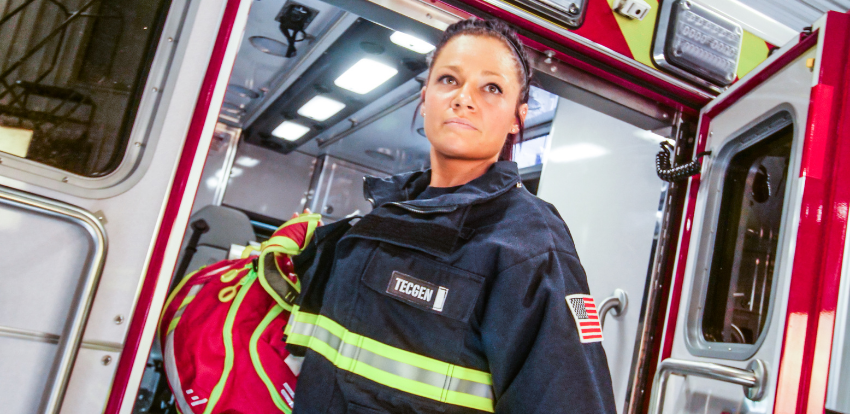What is Fatigue?
Medical emergencies require quick responses during all hours of the day. As a firefighter or emergency medical services (EMS) professional, staying alert to respond to every call can cause negative effects on your mind and body. Fatigue is a serious problem among public safety workers. It's now more important than ever to be aware of the signs of this lingering tiredness.
Chronic fatigue can result in:
- A compromised immune system
- Decreased productivity
- Burnout
- Reduced alertness
- Lack of motivation
- Increased irritability
- Depression
On average, most firefighters work long duration shifts of 24 or 48 hours. During an active fire, wildland firefighters can work up to 72 hour shifts. EMS workers will typically complete 12 to 24 hour shifts. Factoring in overtime, this will increase the number of hours worked per day. One thing is clear, these long shift hours can really take a toll on your body.
You can fight fatigue through these 5 best practices 👊:
1. EAT A BALANCED DIET 🍌
Refined carbs and processed foods can deplete your energy levels. Foods packed with processed oils and fats will make you feel even more sluggish. You can get rid of that feeling by including anti-inflammatory foods that will promote healthy digestion and help with chronic fatigue. Getting enough nutrients to sustain your body for a long shift is important. Here is a list of foods you can interchange with your next meals:
- Apples
- Walnuts
- Chocolate
- Beans
- Whole grains
- Avocado
- Fish
Eating iron-rich foods will also increase your blood flow to carry oxygen to your muscles and tissues. As a firefighter or EMS worker, you can have extremely physically active days, with both types of work being linked back to chronic-cardiovascular diseases. To prevent this, eating iron-rich foods can boost your immune system and protect your well-earned muscles. 💪 Add these foods to your diet to keep your body in check:
- Spinach
- Kale
- Cabbage
- Collard greens
- Whole grains
- Meat
- Bread
- Cashews
- Almonds
- Walnuts
2. DRINK MORE WATER 💧
Drinking more water throughout the day can help combat dehydration. Especially if you've been training or responding to an active fire call. Our bodies are made up of water so it's good to make sure you're drinking enough. The recommendation is 8-ounce glasses of water every day depending on your body size. If you don't drink enough water, dehydration can cause serious side effects. It can lead to muscle cramps, body soreness, and slow recovery time.
Working in emergency services means you always need to be ready to move. You don't want to be the one who slows down the team because of muscle soreness. Increase your water intake to fuel your body and stay focused on the job. Dehydration can have a noticeable effect if you lose 2% of your body's water content. It's important that when you're doing physical activity, you have water by your side. If you need to spice up the taste of your water, add flavor packets!
3. CUT DOWN ON CAFFEINE ☕
Lowering your caffeine intake can help you feel more energized over-time. Instead of grabbing a large cup of coffee in the morning, drink water. Re-hydrating with water is best for optimal digestion and mental focus. Slowly reducing your coffee intake can combat those mid-day caffeine crashes. You can also switch to drinking green tea, which is known for its health benefits. Avoid drinking any caffeinated or sugary drinks after dinner so your body can wind down for a good night’s rest. Having too much caffeine can cause withdrawal symptoms such as:
- Headaches
- Drowsiness
- Migraines
- Irritability
- Anxiety
4. DO A MENTAL HEALTH CHECK 🧠
Working in the public safety category can put a toll on your mental health. Actively responding to calls and completing long shifts can significantly drop your energy levels. If you are experiencing symptoms of feeling worried, stressed, or burnt-out try taking a quick break to re-focus. Some of these symptoms can lead to restlessness, and cause unhealthy sleep patterns. Take time to call a loved one, read a book, or stretch your body. 🙏
5. PRIORITIZE SLEEP 🌙
Getting a genuine rest in-between shifts is vital to optimal performance when working. When your body does not get enough rest you:
- Increase your risk of cancer
- Increase your chance of getting sick
- Become light-headed
- Increase your chance of gaining weight
- Cannot think clearly
Designating a set number of hours each night you sleep will combat fatigue. On average, it takes 10-20 mins for you to fall asleep. You can easily improve your sleep using these tips:
- Put your phone away 30 mins before you head to bed
- Try reducing light exposure
- Practice guided meditation or yoga to relax your body
- Write in a journal to let go of any stressful thoughts
- Wear comfortable clothes to sleep in
- Read a book
These lifestyle changes can improve how you respond to calls and serve the community. Start with a tip that can easily integrate with your routine.






Leave a Reply